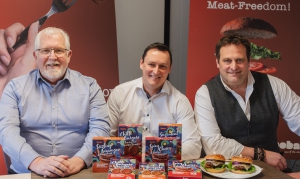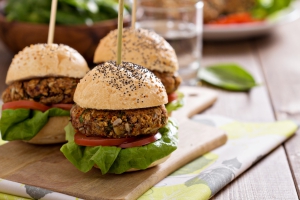PLANT-based burgers and bangers that could “revolutionise” food production in the UK have finally hit the shelves.
MYCO’s pioneering range has been rolled out having been in development for well over a year.
The products are made from Hooba, the Yorkshire firm’s own plant-based protein. Hooba is manufactured under the same roof as Myco’s pioneering vertical farm, where the oyster mushrooms used to create the protein are grown.
This completely unique production process, which results in reduced food miles, has resulted in Myco being heralded as creating ‘Britain’s Greenest Burger’.
Now 10,000 of those burgers – along with 20,000 Hooba sausages – have initially been produced for the long-awaited launch.
“Developing and perfecting these products has been a true labour of love, so to finally bring them to market is an incredibly proud moment,” said Sales Director, Andy Fenner.
“Myco’s team is full of parents and grandparents who want to play their part in giving our planet a future. Humans eat too much meat, so we need to find ways to make swapping it out of our diets a bit more appetising.
“We wanted to manufacture a product that matched meat for texture and taste – and the feedback has been glowing.
“In a blind taste test, our sausages and burgers beat some of the biggest plant-based brands in Britain, and there was high praise for the mouthfeel which, historically, has been one of the big stumbling blocks to people eating less meat.
“Our next goal is to get Hooba onto shelves and tables across the country and let suppliers and customers see how good it tastes for themselves.
“We are over-the-moon that our range is finally packaged and ready to go and given how little impact its production has on our planet, we believe this could revolutionise the way food is manufactured. Our hope is that our sustainable manufacturing process could become a blueprint for the food industry.”
Having already agreed listings with multiple suppliers, including some leading artisanal and plant-based wholesalers, the team have also been in pre-launch discussions with a range of retailers with the view of stocking and using Hooba.
And production will be ramped up considerably over the coming years.
Having appointed former Vbites boss David Wood as CEO, Myco is set to create around 70 jobs following a £1.2m investment earlier this year.
Those jobs will be based at the Leeming Bar production plant, which is the first in Britain to both grow and manufacture a plant-based protein under the same roof.
Source: Myco
Plant-based meat products served out-of-home grow by almost 50% across Europe’s ‘Big 5’ countries
- Sizzling 90% growth for plant-based burgers, while sales of sandwiches fall
- Annual consumer spend finally exceeds pre-COVID 19 levels, but visits to OOH hospitality venues remain lower at -10%
- 25% of Europe’s Big 5 population follow a flexitarian diet – a trend that is set to grow in 2024
BRACKNELL, UK – 8 November 2023 – According to research from Circana, the leading advisor on consumer complexity that formerly traded as IRI and The NPD Group, the trend towards eating alternative plant-based meat protein products in out- of-home (OOH) eateries, such as quick-service restaurants (QSR), cafes, pubs and bars has increased by 48% in servings compared to 2019 across Europe’s ‘Big 5’ countries. While in other food protein categories, the number of total product servings declined, including Beef (-5%), Pork (-16%), Chicken (-5%), Fish/Seafood (-13%) and Other Meat (-20%).
Typically made from ingredients such as soy, peas, lentils and mushrooms, plant-based products have gained popularity in recent years as fast-food chains and restaurants throughout Europe cater to growing consumer demands for sustainable, healthier and cruelty-free menu options. When asked about factors influencing their choice of where to eat out, 45% of consumers overall said they are more loyal to restaurants that care about sustainability, with Italy voicing the strongest concern (56%) followed by Spain (49%) and the UK least concerned (38%).
Burgers buck the trend
Compared with other protein categories, plant-based meat has shown the strongest growth across all formats since 2019. The overall number of servings across each protein category has dropped with one exception – burgers. While the number of servings in other formats, such as sandwiches and wraps, have declined, the burger has shown solid growth (Beef +4%, Chicken +16%, Fish +11%, Other Meat +14%).
Despite the overall decline in visits to OOH venues, plant-based burgers grew significantly by +90% during year ending August 2023 vs 2019, and +20% year-on-year ending Aug 2023, representing a quarter (25%) of the total contribution made to growth in burgers.
Please read the full article here.
Source photo: Kent Wild Life Trust
Plant-based mushroom innovation sees the light
Growing mushrooms above ground and sprouting soybeans are two entrepreneurial efforts looking to make plant-based protein ingredients more nutritious, affordable and sustainable.
Mush Foods, Ltd., Rehovot, Israel, a portfolio company of the Strauss Group Kitchen FoodTech Hub founded in 2021, now offers a 50CUT mycelium protein ingredient system to reduce the animal protein content in meat products by 50%, said Shalom Daniel, co-founder and chief executive officer of Mush Foods. The ingredient requires no agricultural land and uses minimal energy and water, according to the company. Cultivation does not depend on season or climate.
A binder and whole protein, the mushroom mycelium needs no added binders and offers an umami flavor and a fleshy meat-like texture as well as fiber, vitamins and minerals, Mr. Daniel said.
The company so far has developed 50CUT beef and 50CUT chicken. Pilot plants will be built in the United States. Company plans are to launch sales in the first quarter of 2024.
Read the full article here.
Source: Food Business News
With their mushroom-based pork alternative, Baltimore-based company Meat the Mushroom is working to encourage consumers to adopt healthy, plant-based diets.
The company’s first product, a bacon alternative known as SHROOMACON, consists of five ingredients and is free of preservatives, soy, gluten, and cholesterol.
Founders of the company Marvin Montague and Aleah Rae Dorsey, originally intended to open a vegan restaurant that didn’t rely on soy as the primary protein source. Hoping to develop a more natural, non-processed alternative Montague began experimenting with ways to give mushrooms a meatier texture.
Over time, Montague realized that he could have a greater impact if he focused his efforts on retail products. “I see the people around me could benefit from going vegan, but they just don’t know [the benefits],” Montague tells Food Tank. “And if they do know, it’s hard to kick animal products.”
























